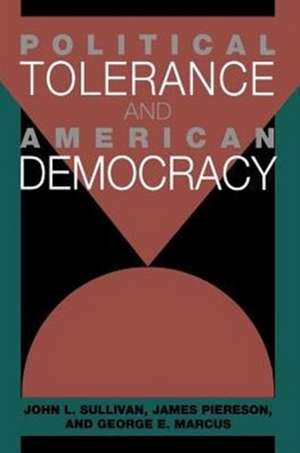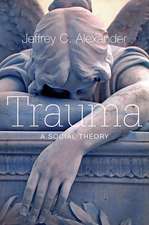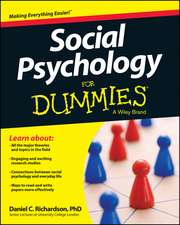Political Tolerance and American Democracy
Autor John L. Sullivan, James Piereson, George E. Marcusen Limba Engleză Paperback – 28 feb 1993
This path-breaking book reconceptualizes our understanding of political tolerance as well as of its foundations. Previous studies, the authors contend, overemphasized the role of education in explaining the presence of tolerance, while giving insufficient weight to personality and ideological factors. With an innovative methodology for measuring levels of tolerance more accurately, the authors are able to explain why particular groups are targeted and why tolerance is an inherently political concept. Far from abating, the degree of intolerance in America today is probably as great as it ever was; it is the targets of intolerance that have changed.
Preț: 290.34 lei
Nou
Puncte Express: 436
Preț estimativ în valută:
55.56€ • 59.41$ • 46.32£
55.56€ • 59.41$ • 46.32£
Carte tipărită la comandă
Livrare economică 17 aprilie-01 mai
Preluare comenzi: 021 569.72.76
Specificații
ISBN-13: 9780226779928
ISBN-10: 0226779920
Pagini: 288
Dimensiuni: 152 x 229 x 23 mm
Greutate: 0.41 kg
Ediția:1
Editura: University of Chicago Press
Colecția University of Chicago Press
ISBN-10: 0226779920
Pagini: 288
Dimensiuni: 152 x 229 x 23 mm
Greutate: 0.41 kg
Ediția:1
Editura: University of Chicago Press
Colecția University of Chicago Press
Cuprins
Preface
1. Tolerance and Democracy
The Concept of Political Tolerance
The Limits of Tolerance
Democratic Theories and Political Tolerance
Summary and Conclusion
2. Political Tolerance and American Politics: The Empirical Literature
Communism, Conformity, and Civil Liberties
Tolerance and the Democratic Creed
Changing Levels of Tolerance, 1954-1978
Alternative Strategies for Measuring Tolerance
Attitudes and Behavior
Implications for the Study of Tolerance
3. A Profile of Political Tolerance in the 1970s: Implications of a Different Approach
Changing Levels of Political Tolerance: The Stouffer Items
A Content-Controlled Measure of Political Tolerance
The Twin Cities Samples
The Content-Controlled Measure: The Problem of Validity
A Framework for the Analysis of Political Tolerance
Appendix 3-A
4. The Pluralistic Intolerance: The Distribution of Target Groups in American Society
The Problem of Intensity
Pluralistic Intolerance
The Distribution of Target Groups
Social and Political Bases of Target Group Selection
Levels of Tolerance for the Different Groups
5. The Social Sources of Political Tolerance
The Dependent Variable: Degree of Political Tolerance
Education, Social Status, and Tolerance
Gender and Tolerance
Race and Tolerance
Aging, Generations, and Tolerance
Religion and Tolerance
Urbanization and Tolerance
Region and Tolerance
Conclusions
6. The Psychological Sources of Political Tolerance
Maslow's Need Hierarchy and Tolerance
Socialization, Authoritarianism, and Tolerance
Dogmatism and Tolerance
Social Learning Theory and Tolerance
Conclusions
7. Political Explanations of Tolerance
Some Limits to the Analysis: The Political Context
Objections to Target Groups
Tolerance and Ideology
Political Threat and Tolerance
Tolerance and Political Involvement
Support for the General Norms of Democracy
Summary and Conclusions
8. A Multivariate Model of Political Tolerance
A Model for the Analysis of Political Tolerance
Parameter Estimation
Internal and External Threat
Alternative Types of Perceived Threat
Political Elites and the Processes of Political Tolerance
Social Tolerance
Tolerance and Stouffer's Content-Biased Measures
Summary and Conclusions
Appendix 8A. Statistical Procedures
9. Political Tolerance: Implications for Democratic Theory
Summary of Findings
Implications for Democratic Theory
Concluding Comments
Bibliography
Index
1. Tolerance and Democracy
The Concept of Political Tolerance
The Limits of Tolerance
Democratic Theories and Political Tolerance
Summary and Conclusion
2. Political Tolerance and American Politics: The Empirical Literature
Communism, Conformity, and Civil Liberties
Tolerance and the Democratic Creed
Changing Levels of Tolerance, 1954-1978
Alternative Strategies for Measuring Tolerance
Attitudes and Behavior
Implications for the Study of Tolerance
3. A Profile of Political Tolerance in the 1970s: Implications of a Different Approach
Changing Levels of Political Tolerance: The Stouffer Items
A Content-Controlled Measure of Political Tolerance
The Twin Cities Samples
The Content-Controlled Measure: The Problem of Validity
A Framework for the Analysis of Political Tolerance
Appendix 3-A
4. The Pluralistic Intolerance: The Distribution of Target Groups in American Society
The Problem of Intensity
Pluralistic Intolerance
The Distribution of Target Groups
Social and Political Bases of Target Group Selection
Levels of Tolerance for the Different Groups
5. The Social Sources of Political Tolerance
The Dependent Variable: Degree of Political Tolerance
Education, Social Status, and Tolerance
Gender and Tolerance
Race and Tolerance
Aging, Generations, and Tolerance
Religion and Tolerance
Urbanization and Tolerance
Region and Tolerance
Conclusions
6. The Psychological Sources of Political Tolerance
Maslow's Need Hierarchy and Tolerance
Socialization, Authoritarianism, and Tolerance
Dogmatism and Tolerance
Social Learning Theory and Tolerance
Conclusions
7. Political Explanations of Tolerance
Some Limits to the Analysis: The Political Context
Objections to Target Groups
Tolerance and Ideology
Political Threat and Tolerance
Tolerance and Political Involvement
Support for the General Norms of Democracy
Summary and Conclusions
8. A Multivariate Model of Political Tolerance
A Model for the Analysis of Political Tolerance
Parameter Estimation
Internal and External Threat
Alternative Types of Perceived Threat
Political Elites and the Processes of Political Tolerance
Social Tolerance
Tolerance and Stouffer's Content-Biased Measures
Summary and Conclusions
Appendix 8A. Statistical Procedures
9. Political Tolerance: Implications for Democratic Theory
Summary of Findings
Implications for Democratic Theory
Concluding Comments
Bibliography
Index
















